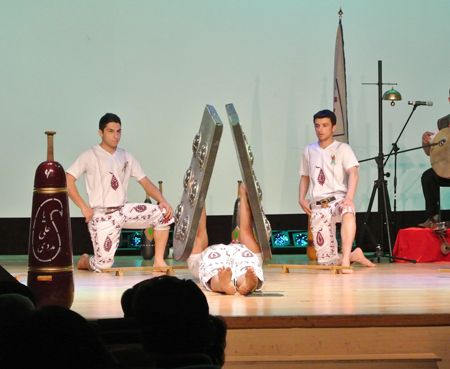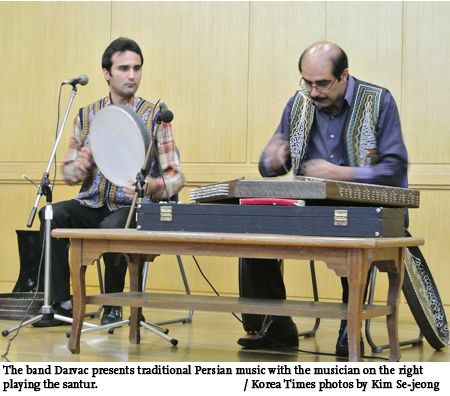
Half a century of Korea-Iran ties celebrated

Recently, Korea and Iran have walked on an icy road. Iran’s alleged ambition to develop nuclear weapons has escalated tensions with Israel and the United States. The fallout has been felt by Korea, which has been strategically silent about Iran due to rather vibrant commercial ties.
Last Thursday at the Yeoksam 1 Cultural Center, the frost was far from being felt. Invited by the Iranian Embassy in Seoul, a group of musicians and wrestlers brought a pleasant surprise and entertainment to the assembled audience.
The occasion was to celebrate the 50th anniversary of diplomatic ties between Korea and Iran.
A music band Darvag played a traditional instrument called santur with a compelling sound.
Iranian Ambassador to Korea Ahmad Masoumifar, the host of the event, hoped the future 50 years will be defined by a robust flow of cultural exchange between the two countries.
Trade and commerce have dominated Korea-Iran relations, which officially began in 1962.
As for oil-dependent Korea, eyes were fixed on Iranian oil and related business opportunities. Started 30 years ago, the so-called Tehran Road in Seoul and Seoul Road in Teheran constitutes a definitive moment in the Korea-Iran relations and crystallized the mayors of Seoul and Tehran exchanged visits 30 years ago,” according to Hossein Darvishi, a consular official of the embassy.
Korea’s soap operas exported to Iran are currently an important bridge.
“Dae Jang Geum” and “Jumong” has steadily grown in popularity in Iran.
One Korean student at the event who studies Persian language at Hankuk University of Foreign Studies and lived in Iran for one year, said, “When ‘Dae Jang Geum’ was screened, streets in Tehran were empty.”
Very little Iranian cultural elements are found in contemporary Korean culture.
One ancient Iranian epic discovered two years ago contained a love story between a Persian prince and a princess of the Silla Kingdom (57B.C. – 935A.D.).
Translation of the text is currently underway spearheaded by a Korean scholar with observers hoping that it will deepen relations between both countries. <The Korea Times/Kim Se-jeong>



